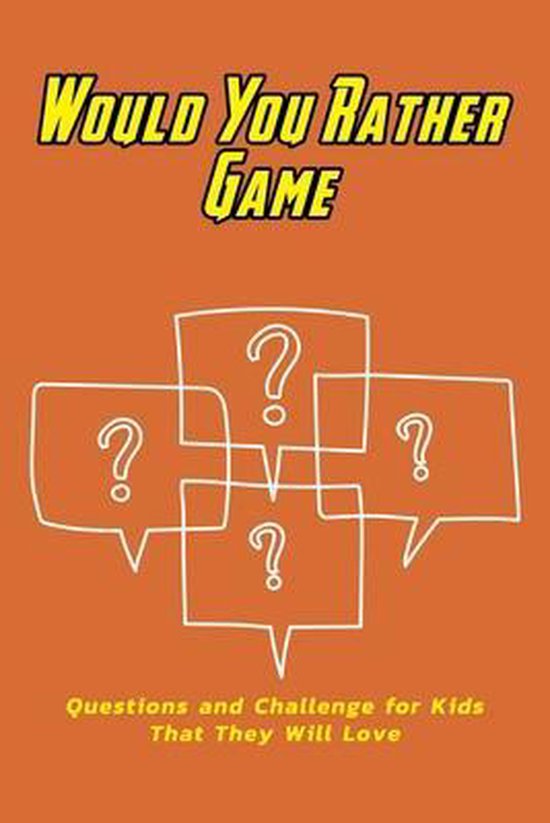The Allure Of "Would You Rather" Games: A Comprehensive Exploration
The Allure of "Would You Rather" Games: A Comprehensive Exploration
Related Articles: The Allure of "Would You Rather" Games: A Comprehensive Exploration
Introduction
With enthusiasm, let’s navigate through the intriguing topic related to The Allure of "Would You Rather" Games: A Comprehensive Exploration. Let’s weave interesting information and offer fresh perspectives to the readers.
Table of Content
The Allure of "Would You Rather" Games: A Comprehensive Exploration

"Would You Rather" games, a staple of casual entertainment, transcend mere amusement. These simple, thought-provoking scenarios offer a window into human psychology, social dynamics, and even ethical decision-making. This exploration delves into the captivating nature of "Would You Rather" games, examining their structure, benefits, and potential applications beyond casual fun.
The Structure of "Would You Rather" Games:
At its core, a "Would You Rather" game presents two distinct options, often posing a dilemma or forcing a choice between two seemingly undesirable outcomes. This simple structure fosters engagement by:
- Engaging the Imagination: The game necessitates players to envision themselves in the hypothetical situations presented, prompting them to consider the consequences of each choice.
- Stimulating Critical Thinking: Players must weigh the pros and cons of each option, leading to a deeper analysis of their own values and priorities.
- Creating a Shared Experience: The game encourages conversation and debate, fostering a sense of community and shared understanding.
The Benefits of "Would You Rather" Games:
Beyond entertainment, "Would You Rather" games offer a range of benefits:
- Enhancing Cognitive Abilities: The need to evaluate options and make decisions strengthens critical thinking, problem-solving skills, and decision-making processes.
- Promoting Social Interaction: The game encourages open dialogue, fostering communication and building relationships. It can be a valuable tool for team-building exercises or facilitating discussions on complex topics.
- Providing Insight into Personal Values: By forcing players to prioritize one option over another, "Would You Rather" games reveal personal values, beliefs, and priorities.
- Creating a Safe Space for Exploration: The hypothetical nature of the game allows players to explore different perspectives and values without fear of judgment.
Applications Beyond Casual Fun:
"Would You Rather" games find applications in various settings:
- Education: Teachers can utilize these games to engage students in discussions about ethical dilemmas, historical events, or scientific concepts.
- Therapy: Therapists can employ "Would You Rather" games as a tool for exploring personal values, uncovering underlying beliefs, and promoting self-awareness.
- Team Building: "Would You Rather" games can be used to foster collaboration, encourage communication, and strengthen team bonds.
- Marketing and Research: Marketers can utilize these games to gauge consumer preferences and gather insights into target audiences.
FAQs About "Would You Rather" Games:
Q: Are "Would You Rather" games suitable for all ages?
A: While "Would You Rather" games are generally suitable for all ages, it is essential to tailor the content to the maturity level of the participants. Age-appropriate topics and scenarios should be chosen to avoid triggering sensitive or inappropriate discussions.
Q: How can I create engaging "Would You Rather" scenarios?
A: To create engaging scenarios, consider:
- Relevance: Choose topics that are relevant to the players’ interests, experiences, or current events.
- Humor: Incorporate humor or wit to make the scenarios more entertaining and memorable.
- Ethical Dilemmas: Present scenarios that pose moral or ethical questions, prompting players to consider different perspectives.
- Personalization: Tailor the scenarios to the specific group or individuals playing the game.
Q: Can "Would You Rather" games be used for educational purposes?
A: Absolutely. Teachers can use "Would You Rather" games to:
- Spark discussions on complex topics: Encourage students to explore different perspectives and engage in critical thinking.
- Reinforce learning: Present scenarios that reinforce key concepts or skills learned in class.
- Assess understanding: Observe students’ responses to gauge their comprehension of the material.
Tips for Playing "Would You Rather" Games:
- Set Ground Rules: Establish clear guidelines for respectful dialogue and avoid judgmental or offensive comments.
- Encourage Participation: Create a welcoming environment where everyone feels comfortable sharing their thoughts and opinions.
- Embrace the Unexpected: Be open to unexpected responses and engage in discussions that challenge your own beliefs.
- Have Fun: Remember that "Would You Rather" games are ultimately meant to be enjoyable and entertaining.
Conclusion:
"Would You Rather" games, seemingly simple in structure, offer a profound window into human psychology, social dynamics, and personal values. Their ability to engage the imagination, stimulate critical thinking, and foster conversation makes them a valuable tool for entertainment, education, and personal growth. Whether enjoyed casually or employed strategically, "Would You Rather" games continue to captivate and challenge us, reminding us of the complexities of human decision-making and the power of simple, thought-provoking scenarios.








Closure
Thus, we hope this article has provided valuable insights into The Allure of "Would You Rather" Games: A Comprehensive Exploration. We appreciate your attention to our article. See you in our next article!